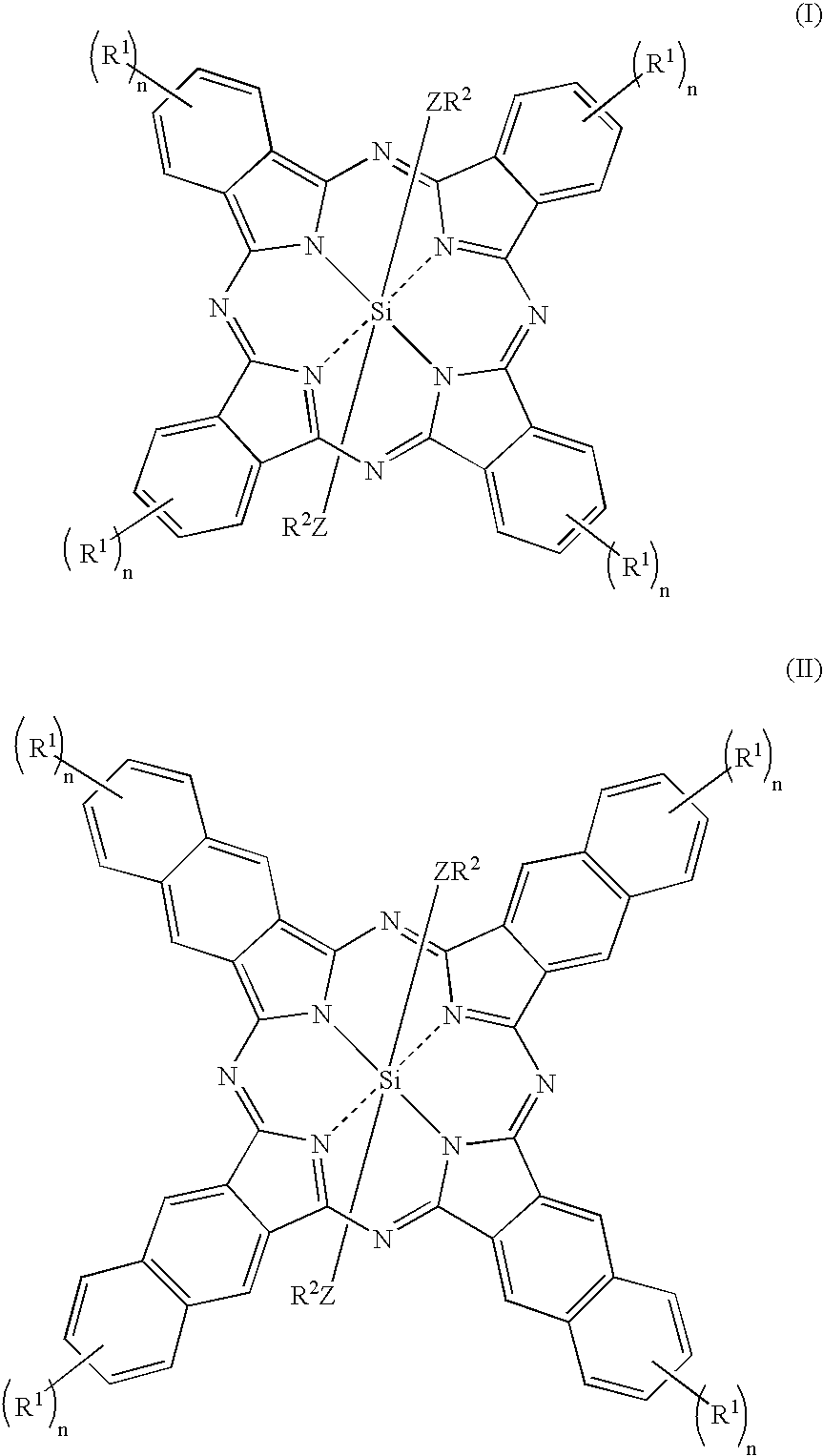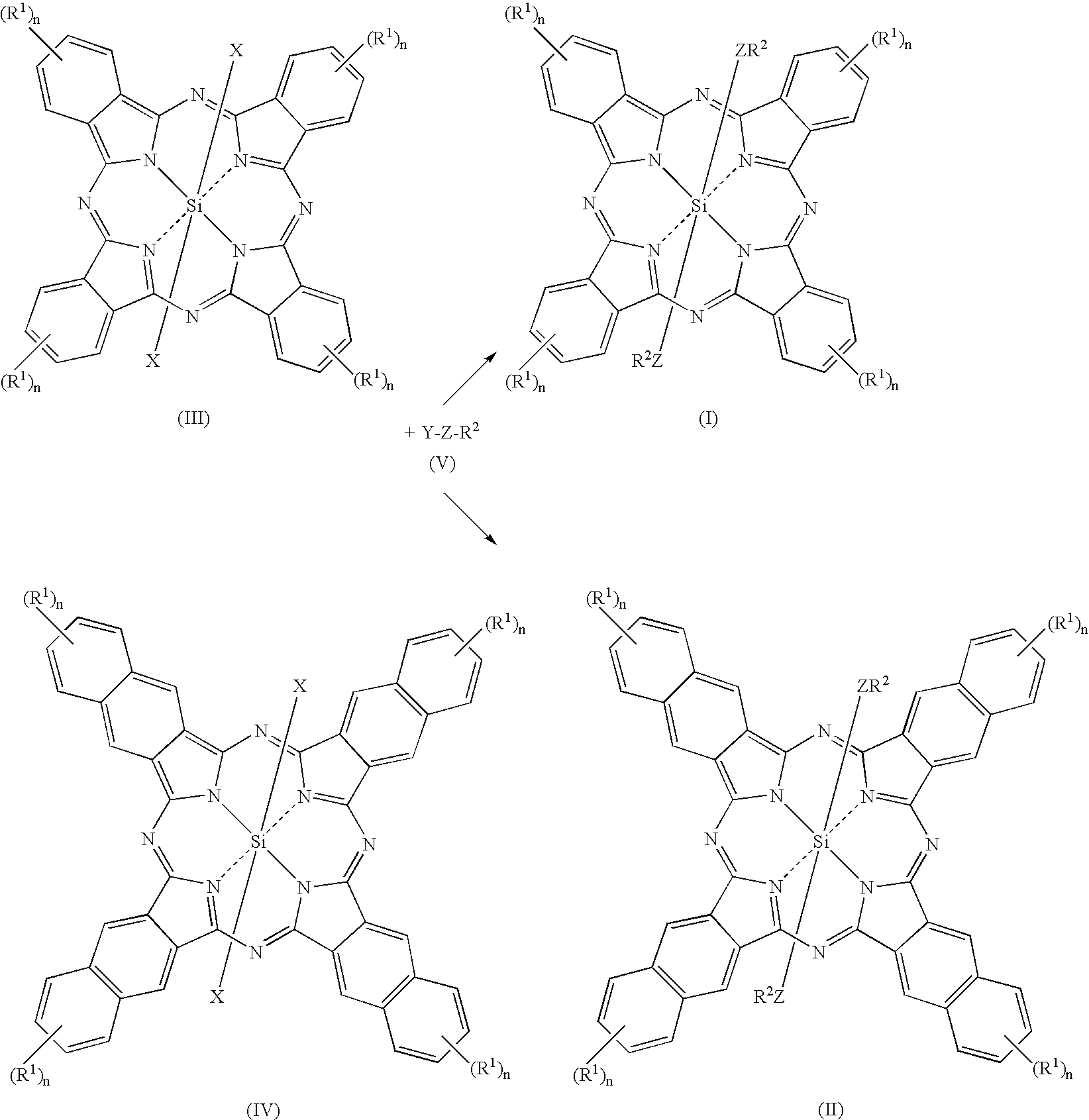Fluorinated silicon phthalocyanines and naphthalocyanines for electrophoretic display
a technology of fluorinated silicon and phthalocyanine, which is applied in the field of stable colorants, can solve the problems of dyes or pigments that are not soluble in fluorinated solvents, dyes that typically show poor shelf-life stability, and long reaction tim
- Summary
- Abstract
- Description
- Claims
- Application Information
AI Technical Summary
Problems solved by technology
Method used
Image
Examples
preparation 1
Preparation of Rf-Amine Oligomers for Microencapsulation
[0057]
[0058]17.8 Grams of Krytox® methyl ester (MW=˜1780, a=about 10, from DuPont) was dissolved in a mixture of 12 g of 1,1,2-trichlorotrifluoroethane (Aldrich) and 1.5 g of α,α,α-trifluorotoluene (Aldrich). The resulting solution was added drop by drop into a solution containing 7.3 g of tris(2-aminoethyl)amine (MW=146, from Aldrich) in 25 g of α,α,α-trifluorotoluene and 30 g of 1,1,2-trichlorotrifluoroethene, over 2 hours with stirring at room temperature. The mixture was then stirred for another 8 hours to allow the reaction to complete. The IR spectrum of the product clearly indicated the disappearance of the C═O vibration for the methyl ester at 1780 cm−1 and the appearance of the C═O vibration for the amide product at 1695 cm−1. The solvents were removed by rotary evaporation followed by vacuum stripping at 10° C. for 4-6 hours (1 Torr). The crude product was then dissolved in 50 ml of PFS-2 solvent (low molecular weight...
preparation 2
Preparation of Density Matched TiO2 Microcapsules
[0059]5.9 Grams of TiO2 R900 (DuPont) was added to a solution consisting of 3.77 g of MEK, 4.31 g of N3400 aliphatic polyisocyanate (Bayer AG) and 0.77 g of 1-[N,N-bis(2-hydroxyethyl)amino]-2-propanol (Aldrich). The resulting slurry was homogenized for 1 minute at 5-10° C.; 0.01 g of dibutyltin dilaurate (Aldrich) was added and homogenized for an additional minute at 5-10° C.; and finally a solution containing 20 g of HT-200 and 0.47 g of Rf-amine1900 (from Preparation 1) was added and homogenized again for 3 minutes at room temperature.
[0060]The slurry prepared above was emulsified slowly at room temperature by a homogenizer into a mixture of 31 g of HT-200 and 2.28 g of Rf-amine-650 (from Preparation 1). The resulting microcapsule dispersion was kept stirring under low shear by a mechanical stirrer at 35° C. for 30 minutes and at 80° C. for 3 hours to remove MEK and post cure the microcapsules. The microcapsule dispersion showed a n...
example 1
Synthesis and Evaluation of Fluorinated Silicon Phthalocyanine Compound (1)
[0061]As shown in Scheme 1 below, the 2 step, 1 pot procedure involves conversion of a highly fluorinated ether alcohol (Krytox™ from DuPont) to its sodium salt, followed by, without isolation, reaction with silicon phthalocyanine dichloride (Aldrich).
The Structure of Compound (1)
[0062]
[0063]A mixture of Krytox™ monofunctional alcohol (M.W. 1571, 6.51 g, 4.15 mmol, Du Pont), sodium lump (0.14 g, 6.09 mmol) and anhydrous ether (20 mL) was refluxed for 23 hours under Ar atmosphere. The resulting mixture was added to a suspension of silicon phthalocyanine dichloride [dichloro(29H,3H-phthalocyaninato)silicon, SiPcCl2] (1.00 g, 1.64 mmol, Aldrich), toluene (80 mL) and pyridine (20 mL), where the toluene and pyridine each had been dried by distillation (˜10 mL of distillate) via pipette (without adding unreacted sodium pieces). The resulting mixture was distilled slowly over 24 hours (˜40 mL distillate) via a Dean-...
PUM
| Property | Measurement | Unit |
|---|---|---|
| temperature | aaaaa | aaaaa |
| dielectric constant | aaaaa | aaaaa |
| dielectric constant | aaaaa | aaaaa |
Abstract
Description
Claims
Application Information
 Login to View More
Login to View More - R&D
- Intellectual Property
- Life Sciences
- Materials
- Tech Scout
- Unparalleled Data Quality
- Higher Quality Content
- 60% Fewer Hallucinations
Browse by: Latest US Patents, China's latest patents, Technical Efficacy Thesaurus, Application Domain, Technology Topic, Popular Technical Reports.
© 2025 PatSnap. All rights reserved.Legal|Privacy policy|Modern Slavery Act Transparency Statement|Sitemap|About US| Contact US: help@patsnap.com



